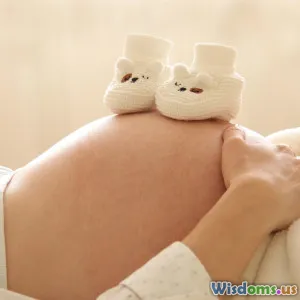
Why Apologies Matter More Than You Realize in Marriage
9 min read Explore the profound impact of sincere apologies in marriages and learn why they are essential for lasting love and trust. (0 Reviews)
Why Apologies Matter More Than You Realize in Marriage
Marriage is a complex journey—a dance of intimacy, communication, and mutual growth. Inevitably, conflicts arise, and misunderstandings threaten harmony. Often underestimated in their power are simple apologies. But why do apologies matter so profoundly in marriage? This article explores the hidden weight apologies carry in preserving love, restoring trust, and deepening emotional connection.
The Power Behind a Sincere Apology
At first glance, an apology can seem like a simple phrase – “I’m sorry.” However, apologies within a marital context go far beyond politeness; they are crucial emotional tools.
Dr. John Gottman, a prominent psychologist specializing in marital stability, states that the ability to make and accept a sincere apology is a hallmark of successful couples. His longitudinal research reveals that couples who repair conflicts effectively—including through meaningful apologies—are significantly more likely to stay together happily.
Healing Emotional Wounds
When words or actions hurt a partner, the relationship carries a psychological scar. Apologizing is akin to a salve for these emotional wounds. It acknowledges pain, validating the injured person’s experience rather than dismissing it. Without such acknowledgment, resentment and emotional distance may fester.
Real-life example: Consider Sarah and David, who had a heated argument where David’s harsh words deeply hurt Sarah. Instead of brushing it off, David took time to reflect and apologized sincerely, saying, “I regret speaking so harshly, and I understand it hurt you—I’m sorry.” This openness allowed Sarah to feel seen and loved, helping them move forward rather than spiral into bitterness.
Strengthening Trust Through Apologies
Trust is the foundation of any relationship, especially marriage. It fosters safety and emotional security. However, when conflicts breach that trust, apologies function as bridges to rebuild it.
How Apologies Repair Trust
- Taking Responsibility: Owning mistakes shows integrity.
- Expressing Remorse: Genuine regret indicates empathy.
- Making Amends: Offering to change behavior reinforces commitment.
A respected study by Dr. Bella DePaulo published in Personal Relationships showed that partners view apologies as key repair mechanisms, especially when combined with changed behavior.
Example: Apologies Preventing Escalation
In another case, a couple disagreed on finances, leading to accusations. Maria apologized for raising her voice and explained her fears about security rather than blaming. This broke the cycle of hostility and opened constructive dialogue. The apology helped restore financial trust and emotional understanding.
Emotional Intimacy: The Hidden Benefit of Apologies
Marriage thrives on intimacy, which includes vulnerability and authenticity. Apologizing demands both—revealing one’s flaws and emotions honestly.
Vulnerability Builds Connection
Dr. Brené Brown, a leading expert on vulnerability, argues that true connection requires courage to admit imperfections. Apologies manifest this vulnerability and thereby strengthen closeness.
When a partner apologizes sincerely, it lowers defenses and invites empathy. It fosters mutual transparency and breaks down emotional walls created by fear or pride.
Apology as an Invitation
Apologizing is not only reparative but also an invitation—to rebuild, recommit, and understand one another more deeply. It signals, "I value you and our relationship enough to admit when I’m wrong."
Why Many Couples Struggle to Apologize
Despite its importance, many couples shy away from apologies. Understanding barriers can help overcome this hurdle.
Common Obstacles
- Fear of Vulnerability: Apologies mean admitting fault, which can be intimidating.
- Misunderstanding Apology: Believing it shows weakness rather than strength.
- Pride and Ego: Protecting self-image often trumps relationship health.
A survey by Marriage.com reported that over 60% of couples experienced prolonged conflicts due to reluctance to apologize, which fueled resentment.
Cultural and Gender Norms
Social conditioning sometimes teaches men or women to suppress apologies. For example, some men may feel societal pressure to be 'strong' and avoid admitting mistakes, while some women may fear their apologies will be exploited.
How to Apologize Effectively in Marriage
An apology isn’t merely saying “I’m sorry.” It involves several key components that transform it into a healing gesture.
Step 1: Acknowledge the Hurt
Clearly recognize what you did wrong and the impact it had on your partner.
- Example: "I realize interrupting you during important conversations was disrespectful."
Step 2: Express Genuine Remorse
Let your partner know you truly regret your actions without making excuses.
- Avoid: "I’m sorry if you felt hurt."
- Use: "I’m sorry for my words and how they made you feel."
Step 3: Take Responsibility
Own your mistakes fully—no blame-shifting.
- E.g., "I shouldn't have raised my voice; it was wrong."
Step 4: Make Amends
Offer solutions or behavior changes to prevent recurrence.
- "Next time, I will pause and listen carefully before responding."
Step 5: Allow Space for Forgiveness
Understand that forgiveness takes time, and your partner may need space.
- Remain patient and respectful of their process.
The Long-term Benefits of Embracing Apologies
Couples who practice sincere and timely apologies enjoy numerous long-term benefits:
- Reduced Conflict: Early repair prevents escalation.
- Enhanced Communication: Creates a safe space for open dialogue.
- Stronger Emotional Bond: Builds empathy and vulnerability.
- Sustained Commitment: Reinforces dedication to each other.
A study published in the Journal of Social and Personal Relationships highlights married couples who routinely apologize demonstrate higher satisfaction and resilience.
Conclusion: Making Apologies a Cornerstone of Your Marriage
In marriage, apologies are far more than mere words—they are powerful tools that heal, rebuild trust, and deepen intimacy. They require courage, empathy, and humility but yield invaluable rewards in relational health.
By embracing the art of genuine apology, couples foster an environment where love can flourish even amid imperfections. Let each apology be an opportunity to grow closer, understand deeper, and reaffirm your lifelong commitment.
Remember Sarah and David? Their ability to apologize openly became a foundation pillar in their relationship—a guiding light through inevitable storms.
It’s time to rethink apologies not as signs of failure, but as expressions of love’s strength and willingness to nurture a marriage that lasts.
“Apologizing doesn’t always mean you’re wrong and the other person is right. It means you value your relationship more than your ego.” — Mark Matthews
Ready to transform your marriage through the power of meaningful apologies? Start today by acknowledging small mistakes and offering sincere words of reconciliation. Watch your love deepen beyond what you imagined possible.
Rate the Post
User Reviews
Other posts in Conflict Resolution
Popular Posts

















